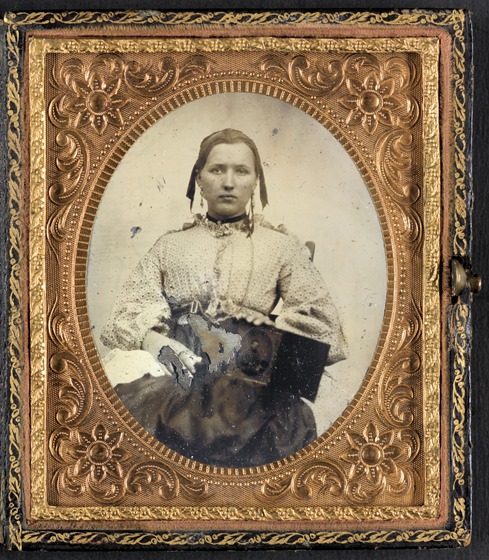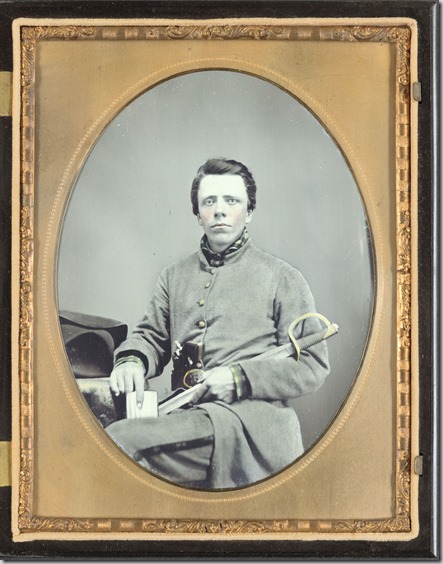May 10th. Commenced with pleasant and clear weather, which continued until six fifteen; at ten A. M., called all hands to muster, and read a general order from Rear-Admiral D. G. Farragut, after which performed Divine service; nothing more worthy of note occurred during the remainder of this day, except it be that firing of great guns was again heard down the river, at eleven fifty-five P. M., supposed to be the lower fleet bombarding the rebel batteries at Port Hudson.
Friday, May 10, 2013
Sunday, 10th.—Skirmishing began at daylight. Relieved at 7 A. M.; went back two miles to regiment. Regiment relieved at 6 P. M.; found brigade at 11 P. M., after marching eleven miles.
Sunday, May 10.—Sad, sad tidings were brought to our cottage this morning! Washington, the youngest and darling son of our dear friend, Mrs. Stuart, has fallen. The mother and sisters are overwhelmed, while our whole household is shrouded in sorrow. He was young, brave, and a Christian. He fell while nobly fighting with his company, the famous Rockbridge Battery, on Marye’s Hill. We have heard no other particulars. The brave boy had scarcely recovered from a most severe wound received last summer near Winchester. To God we commend his afflicted, though quietly submissive, mother. He alone can soothe the sorrow which He has seen fit to permit.
Near Raymond, Miss., Sunday, May 10. Awoke, harnessed and fed horses at 3 o’clock A. M. 7 A. M. unharnessed and grazed our horses for an hour. Lay in the shade until noon, when we hurriedly harnessed, leaving our dinner half cooked, and marched over very dusty and sultry roads. Poor country, covered with pine poles. Halted at Utica two hours and watered horses, let the cavalry pass. This is a lively looking place of two dozen houses, with frowning damsels in the windows and doors. May poles still standing. They did not expect the Yankees so soon. Took the road toward Raymond, eighteen miles distant. At sundown came into camp in thick oak brush. All our cooking utensils in the mule wagons. “By order”‘ obliged to go to bed without our supper save hard crackers.
Unidentified woman with cased photograph of Private W.R. Clack Co. B, 43rd Tennessee Infantry Regiment, possibly Clack’s future wife, Sabria Caroline Newport Clack. They married after the war.
half-plate ambrotype, hand-colored ; 15.7 x 12.7 cm (case)
Donated by Tom Liljenquist; 2012
Liljenquist Family Collection of Civil War Photographs; Ambrotype/Tintype photograph filing series; Library of Congress Prints and Photographs Division.
Record page for image is here.
______________
 Note: This image has been digitally enhanced for fade correction, color enhancement and selected spot removal.
Note: This image has been digitally enhanced for fade correction, color enhancement and selected spot removal.
Civil War Portrait 031
On May 10, 1863, Private Clack is on picket or fortification duty near Big Black River in Mississippi, outside of the Vicksburg fortifications.
__________
Private W.R. Clack of Co. B, 43rd Tennessee Infantry Regiment, with saber, pistol, and small book.
half-plate ambrotype, hand-colored ; 15.7 x 12.7 cm (case)
Donated by Tom Liljenquist; 2012
Liljenquist Family Collection of Civil War Photographs; Ambrotype/Tintype photograph filing series; Library of Congress Prints and Photographs Division.
Record page for image is here.
______________
 Note: This image has been digitally enhanced for fade correction, color enhancement and selected spot removal.
Note: This image has been digitally enhanced for fade correction, color enhancement and selected spot removal.
Civil War Portrait 030
Mrs. Lyon’s Diary.
May 10.—We sat on deck nearly all day to view the scenery, which is very picturesque. The gunboats shelled the bluffs. There are different places where they had cannon stationed, but they did not trouble us. We sat on the bow of the boat to watch the shells explode. We arrived at Nashville without seeing a rebel and very few contrabands. We got there just in time to go to church. Went to the Methodist Church and heard the minister preach Secesh principles.
Sunday, 10th—Our brigade received orders to march at 5 o’clock tomorrow morning. Regimental inspection at 8 o’clock this evening showed the regiment to be in fine order. Companies D and E went out on picket this evening.
May 10.—A member of the Thirty-sixth Tennessee Regiment, Mr. Pike, has just died. He left a message with me for his wife, who lives in Smith County, Virginia. He told me to tell her he was perfectly happy. The nurses have informed mo ho was a most patient sufferer, and prayed nearly all the time.
We have a number of returned prisoners; I believe they are General Churchhill’s men, who were taken at Arkansas Post. Some of them have told me that the ladies in the North treated them with a great deal of kindness, for which they have my blessing. Among our patients we have a colonel, who seems to be much of a gentleman, and is a Christian; he tells me that General Bragg, that best-abused man in the world, has a personal dislike for him, and tries to annoy him in every possible way. I regret hearing any thing like this about one so high in command, as I think it shows a littleness of mind, and makes us lose confidence in him.
10th May (Sunday).—I spent a very rough night in consequence of the badness of the road, the jolting of the carriage, and having to occupy a centre seat.
In the morning we received news from every one we met of the fall of Alexandria.
The road to-day was alive with negroes, who are being “run” into Texas out of Banks’s way. We must have met hundreds of them, and many families of planters, who were much to be pitied, especially the ladies.
On approaching Munroe, we passed through the camp of Walker’s division (8000 strong), which was on its march from Arkansas to meet Banks. The division had embarked in steamers, and had already started down the “Wachita” towards the Eed Eiver, when the news arrived of the fall of Alexandria, and of the presence of Federal gunboats in or near the Wachita itself. This caused the precipitate return and disembarkation of Walker’s division. The men were well armed with rifles and bayonets, but they were dressed in ragged civilian clothes. The old Matagorda man recognised his son in one of these regiments—a perfect boy.
Munroe is on the “Wachita” (pronounced Washtaw), which is a very pretty and wide stream. After crossing it we arrived at the hotel after dark.
Universal confusion reigned there; it was full of officers and soldiers of Walker’s division, and no person would take the slightest notice of us.
In desperation I called on General Hebert, who commanded the post. I told him who I was, and gave him a letter of introduction, which I had fortunately brought from Kirby Smith. I stated my hard case, and besought an asylum for the night, which he immediately accorded me in his own house.
The difficulty of crossing the Mississippi appeared to increase the nearer I got to it, and General Hebert told me that it was very doubtful whether I could cross at all at this point. The Yankee gunboats, which had forced their way past Vicksburg and Port Hudson, were roaming about the Mississippi and Red River, and some of them were reported at the entrance of the Wachita itself, a small fort at Harrisonburg being the only impediment to their appearance in front of Munroe.
On another side, the enemy’s forces were close to Delhi, only forty miles distant.
There were forty or fifty Yankee deserters here from the army besieging Vicksburg. These Yankee deserters, on being asked their reasons for deserting, generally reply,—”Our Government has broken faith with us. We enlisted to fight for the Union, and not to liberate the G—d d—d niggers.” Vicksburg is distant from this place about eighty miles.
The news of General Lee’s victory at Chancellorsville had just arrived here. Every one received it very coolly, and seemed to take it quite as a matter of course; but the wound of Stonewall Jackson was universally deplored.











